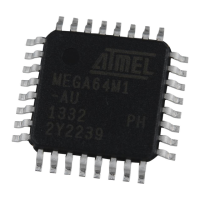230
7647H–AVR–03/12
Atmel ATmega16/32/64/M1/C1
18. Analog to Digital Converter - ADC
18.1 Features
• 10-bit Resolution
• 0.8 LSB Integral Non-linearity (at 2 Mhz)
• ±3.2 LSB Absolute Accuracy
• 8- 250 µs Conversion Time
• Up to 125 kSPS at Maximum Resolution
• 11 Multiplexed Single Ended Input Channels
• 3 Differential input channels with programmable gain 5, 10, 20 and 40
• Optional Left Adjustment for ADC Result Readout
• 0 - V
CC
ADC Input Voltage Range
• Selectable 2.56 V ADC Reference Voltage
• Free Running or Single Conversion Mode
• ADC Start Conversion by Auto Triggering on Interrupt Sources
• Interrupt on ADC Conversion Complete
• Sleep Mode Noise Canceler
• Temperature Sensor
• LiN Address Sense (ISRC Voltage Measurement)
• Vcc Voltage Measurement
The ATmega16/32/64/M1/C1 features a 10-bit successive approximation ADC. The ADC is con-
nected to an 15-channel Analog Multiplexer which allows eleven single-ended input. The
single-ended voltage inputs refer to 0V (GND).
The device also supports 3 differential voltage input amplifiers which are equipped with a pro-
grammable gain stage, providing amplification steps of 14dB (5x), 20 dB (10x), 26 dB (20x), or
32dB (40x) on the differential input voltage before the A/D conversion. On the amplified chan-
nels, 8-bit resolution can be expected.
The ADC contains a Sample and Hold circuit which ensures that the input voltage to the ADC is
held at a constant level during conversion. A block diagram of the ADC is shown in Figure 18-1.
The ADC has a separate analog supply voltage pin, AV
CC
. AV
CC
must not differ more than ±0.3V
from V
CC
. See the paragraph “ADC Noise Canceler” on page 237 on how to connect this pin.
Internal reference voltages of nominally 2.56V or AV
CC
are provided On-chip. The voltage refer-
ence may be externally decoupled at the AREF pin by a capacitor (e.g., 10 nF) for better noise
performance. In any case this capacitor shout not be greater than 10% of the AVCC smoothing
capacitor.

